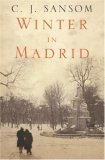FEELING SHATTERED HAVING STAYED UP TOO LATE watching the results of the US Mid-term election results - Woo Hoo, Americans have woken up and given Bush a bloody nose at long last...and that foul man Rumsfeld has gone! Hooray! Mind you, he patronised everybody to the bitter end, in his valedictory speech he said that the war in Iraq was too complex for most people to understand - so he understands it but we don't eh?READING:
I bought The Thirteenth Tale because I had read in the press that it had sold barely 600 copies in the UK but over 70,000 in the USA, and I was curious about it.
From the very first chapter I was totally engrossed in this beautifully written book. The author Diane Setterfield, whose debut novel this is, has written a mesmerizing gothic mystery which explores themes of love, loss, and obsession. The book is structured like novels from an earlier time, with a clear beginning middle and end; and yet...the story loops round on itself, twists and turns and comes back to where it began whilst simultaneously carrying the reader forward towards the end. In brief, it is the story of a famous but reclusive writer, Vida Winter, who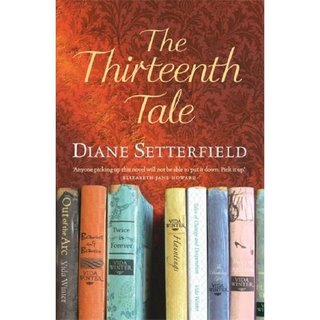 contacts the writer of the book, a young woman by the name of Margaret Lea, daughter of an antiquarian bookseller, and invites her to visit and start writing Miss Winter's official biography. Miss Winter tells her story of the twins Adeline and Emmeline to Margaret in an episodic fashion and Margaret is not always sure if she is being told the truth about Miss Winter's life, or just more of her fiction.
contacts the writer of the book, a young woman by the name of Margaret Lea, daughter of an antiquarian bookseller, and invites her to visit and start writing Miss Winter's official biography. Miss Winter tells her story of the twins Adeline and Emmeline to Margaret in an episodic fashion and Margaret is not always sure if she is being told the truth about Miss Winter's life, or just more of her fiction.
Diane Setterfield pays homage to previous great writers with subtle references to Bronte's Jane Eyre, Collins' The Woman in White, Du Maurier's Rebecca, and James' Turn of the Screw all of which have echoes in this book.
Above all for me, the author articulates what it means to be an avid reader in words that exactly mirror my own experience and feelings:" I have always been a reader; I have read at every stage of my life and there has never been a time when reading was not my greatest joy. And yet I cannot pretend that the reading I have done in my adult years matches in its impact on my soul the reading I did as a child. I still believe in stories. I still forget myself when I am in the middle of a good book. Yet it is not the same. Books are for me, it must be said, the most important thing; what I cannot forget is that there was a time when they were at once more banal and more essential than that. When I was a child books were everything. And so there is in me, always, a nostalgic yearning for the lost pleasure of books."
With this book, Diane Setterfield has given me back some of that childhood lost pleasure.
RANTING:
"Pussy Cat, Pussy Cat where have you been?
I've been up to London to look at the Queen.
Pussy Cat, Pussy Cat what did you there?
I frightened a little mouse under her chair." Well pussy cat, you can’t do that again, you probably wouldn’t be allowed into Buck House, and you are certainly not allowed into the Houses of Parliament. Not if those twits at the Health & Safety Executive have anything to do with it.
Some years ago, MPs began to notice that the House of Commons seemed to be infested with mice. Mice are often a problem in old buildings. The thing about mice is, despite what the huggy-bunny brigade may think, they are not sweet little Beatrix Potter creatures - they are incontinent, disease-carrying vermin. They usually contaminate foodstuffs with urine, droppings, and hair. One mouse can excrete up to 100 fecal pellets per day, as well as deposit hundreds of small droplets of urine during its travels.
In 2002 some Lib Dem MPs asked if a couple of cats could be brought in to sort out the problem. They seem to have been blanked by those who organise the housekeeping of the HoC/HoL although a few old fashioned mousetraps were put down. Recently the mouse situation has become much, much worse. To the extent that they are often seen running about – one even crossed the floor of the Chamber during a debate. The Houses of Parliament have several cafeterias/restaurants/bars all serving food to a greater or lesser extent. In addition, many MPs work through the lunch hour, taking sandwiches and rolls to eat at their desks. Obviously there are crumbs, and their waste paper baskets have the remanents of anything they haven’t consumed. All in all the whole Palace of Westminster is vermin heaven. Why would they bother with traps baited with manky bits of bread and cheese saturated with poison, when there are much better gourmet pickings to be had? Anne McIntosh, a Conservative who represents the Vale of York in Parliament, told the Daily Telegraph that she requested a cat after seeing a mouse in the Commons Tea Room.
I should point out, that if this were a commercial catering outlet anywhere else in the country they would be shut down before you could say gnat’s crochet, and quite rightly too. But because this is the HoC it just carries on as if nothing had happened, despite umpteen complaints.
To be fair, Pest Exterminators have been brought in, but they have concluded that because of the age, complexity and layout of the HoC, it is not a situation they could control.
So a cat or two (or even three or four) would seem to be a Good Idea. After all, what do cats do? They catch mice, indeed you could say that that is their raison d’etre. They are clean animals, they do not run about dribbling urine for a start. They are low cost, work anti-social hours, do not require employment contracts, and will not add to global warming or the balance of payments. But those good old Health & Safety gauleiters who seem to have disproportionate power these days said NO (nix, niet, nein, non).
After all, what do cats do? They catch mice, indeed you could say that that is their raison d’etre. They are clean animals, they do not run about dribbling urine for a start. They are low cost, work anti-social hours, do not require employment contracts, and will not add to global warming or the balance of payments. But those good old Health & Safety gauleiters who seem to have disproportionate power these days said NO (nix, niet, nein, non).
Anne McIntosh was told that a cat would not be permitted as “it might get near food” – so mice can wee and poo all over the tea rooms, that’s ok, but a cat is potentially unhealthy.
Who are the nutters who make these decisions? I despair.
RECIPE:
This week I had intended to have a pot roast for Sunday lunch, but when I got to the butcher's he had no brisket left. So I opted for a shoulder of lamb instead, and asked him to bone it out for me. I have boned a shoulder myself in the past, but it took forever to do and was quite fiddly, a butcher can do it in two shakes of a lamb's tail! Shoulder is cheaper than leg of lamb, but much fattier, and a stuffing soaks some of that up, and makes the meat go further. This is a stuffing I used to make years ago - so it was time to revive it. It has a sort of north African influence, with the apricots and cumin, and is really delicious and different with lamb. Do be sure to season well with salt and pepper though, or the balance of flavours won't be as good.
SHOULDER OF LAMB WITH GREEN PEPPER, APRICOT & PINENUT STUFFING
One large boned shoulder of lamb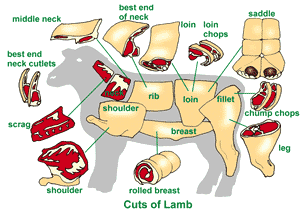
4 slices of good quality brown bread, crusts removed
½ medium sized onion, finely chopped
½ green pepper, cored, seeded and finely chopped
1 tablespoon sunflower oil.
2 tablespoons pine nuts
8 dried apricots, finely chopped
¾ teaspoon ground cumin
Salt and pepper
1 large egg
½ wineglass medium sherry mixed with ½ glass water
1 ball of string
Tear the bread into pieces and whiz into crumbs in a food processor. Tip into a bowl.
Brown the pine nuts in a dry frying pan, stirring constantly, it only takes a few moments. Add to the breadcrumbs.
Add the oil to the frying pan and gently sauté the chopped onion and green pepper for 3 or 4 minutes until translucent and soft. Add to the breadcrumbs, along with the chopped apricot, ground cumin, salt and pepper. Mix all together with a wooden spoon.
Lightly beat the egg with a fork and add it to the mixture, stirring well to bind it all together.
Lay the boned shoulder of lamb on the work surface “skin” side down. Carefully remove any excess fat you can see. Season the surface of the meat with salt and pepper, then spread the stuffing over it evenly, making sure it is in all the pockets in the meat, and that you do not spread it right to the edges.
Roll up the meat carefully, pressing the stuffing in if it bulges out. Cut several pieces of string long enough to go round the rolled lamb, then tie the lamb firmly with string in 3 or 4 places around the roll to hold it together whilst cooking. This is not as difficult as it sounds, but if you haven’t done it before, you may find it easier with someone to help you.
At this point you can set the lamb aside until you are ready to roast it; it can be prepared the day before, and kept overnight in the fridge.
Pre-heat the oven to 180°C.
Place the lamb, joined side down, in a roasting tin (one of those old-fashioned ones with a lid is idea, but you can just cover the tin with cooking foil), and pour the sherry and water over the lamb.
Cover the roasting tin and cook in the oven for 1½ hours.
Remove the cover and return to the oven for a further ½ hour. Remove lamb from the roasting tin strain off any excess fat, and use the juices to make gravy.
Let the lamb rest for 5-10 minutes out of the oven before serving.
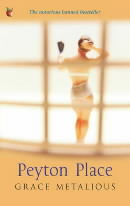 the book.
the book. 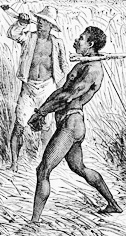 apologising on my behalf and that of my fellow citizens.
apologising on my behalf and that of my fellow citizens. 




















